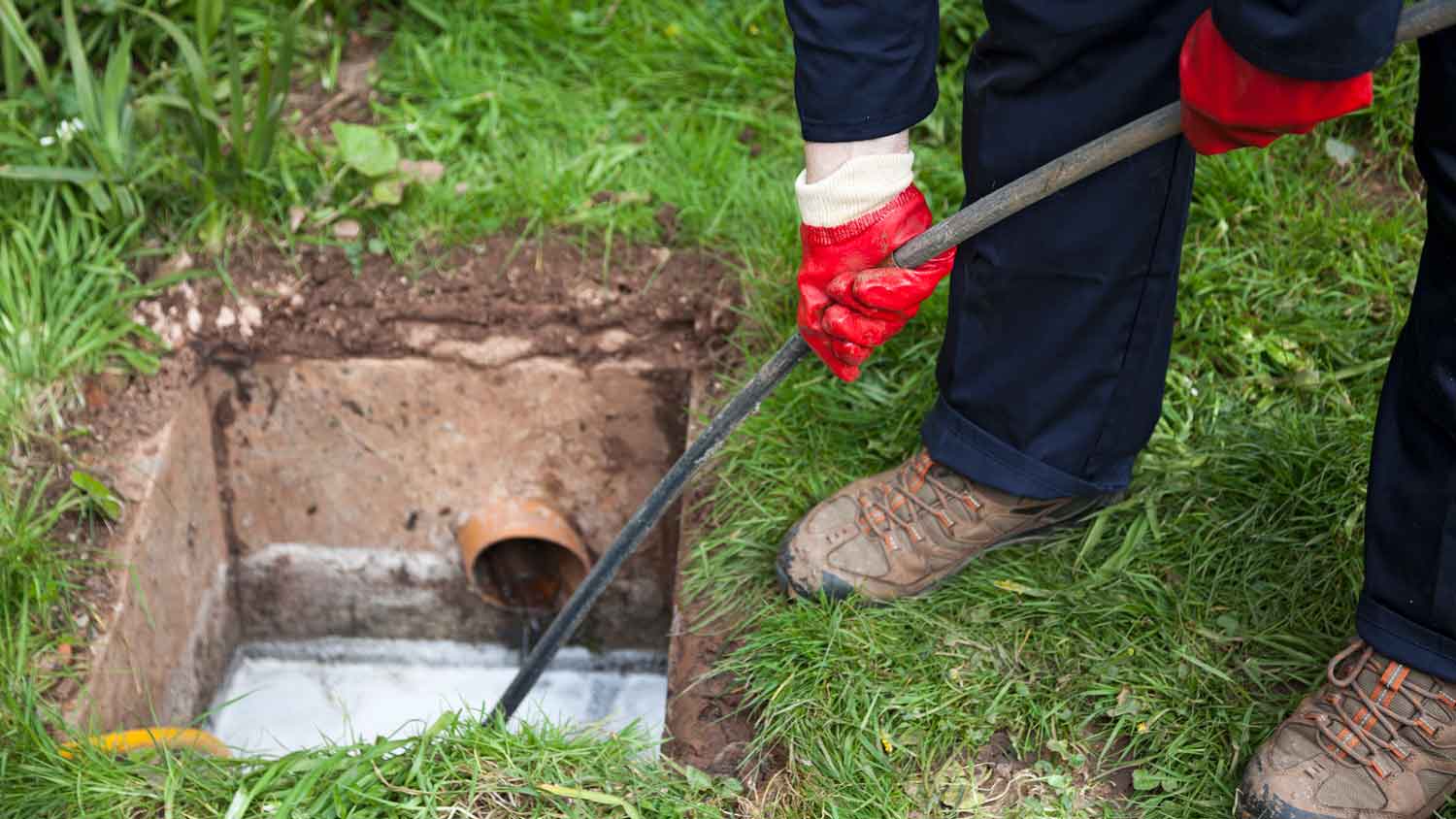
A damaged septic system can leak odors and sewage, so repairs are urgent. Find out how much septic tank repair costs based on repair type, tank size, and more.
Sewer line replacement in Dallas, TX costs $4,803 on average, but it can range between $1,741 and $6,572, depending on pipe material.


Sewer line replacement in Dallas costs an average of $150 per linear foot, including both materials and labor.
PVC piping costs $60 to $200 per linear foot to install and is readily available for sewer line replacement projects in the Dallas-Fort Worth area.
On average, Dallas homeowners need 30 to 40 feet of replacement pipes for sewer line projects.
The City of Dallas charges a $125 inspection fee per trade, including for sewer line replacements.
Depending on pipe material, length, and the condition of the existing infrastructure, sewer line replacement costs an average of $4,803 in Dallas, Texas. Most homeowners spend between $1,741 and $6,572, varying based on the scope of the project. Trenchless methods cost more upfront, but save on restoration expenses of digging up the black alkaline clays typical of Dallas residential areas.
Old cast-iron sewer pipes are common in Dallas, Texas, with aging residential plumbing presenting a significant challenge in homes over 30 years old. Cast iron becomes susceptible to cracks, collapses, and corrosion over time. Whether you notice signs of a clogged sewer line or not, investing in newer PVC replacements can help stave off damage caused by the region's expansive clay soil.
The three most common pipes used for sewer lines are PVC (the most budget-friendly option), ABS (the mid-range option), and copper (the most expensive). Each has its own cost range and preferred use case scenario. In rarer cases, cast iron is used as a sewer pipe material.
Here’s how sewer line replacement costs are affected by pipe material:
| Pipe Material | Average Cost per Linear Foot (Installed) | Pros | Cons |
|---|---|---|---|
| PVC | $60–$200 | The primary approved sewer line material in Texas, resists corrosion from Dallas's alkaline clay soil | Can crack under extreme ground movement from expansive clay, requires careful installation during Dallas's soil shifts |
| ABS | $65–$220 | More impact-resistant than PVC, better flexibility during Dallas's seasonal soil expansion and contraction | Not as universally accepted, may cost more than PVC |
| Copper | $150–$350 | Extremely durable with 50+ year expected lifespan, flexible during soil movement | Most expensive option, can experience mineral buildup from Dallas hard water |
The cost of running a new sewer pipe ranges from $50 to $250 per linear foot, with an average price of $150 per linear foot, which includes both materials and labor. When replacing the sewer line from your house to the main, the distance depends on your specific neighborhood and property. Most Dallas homeowners can expect to need 30 to 40 feet of replacement pipes. The further your house is from the hookup, the longer the sewer pipes and the higher the costs.
Of course, the entire length of the pipe may not require replacement, so discuss options with your pro.
A partial replacement will be the most affordable option, with complete replacement and replacing burst pipes ranging from $60 to $250 per linear foot. Knowing how often to clean your sewer drain can prevent the need for premature full replacements. Here’s how costs break down by type of sewer line replacement:
| Replacement Type | Average Cost per Linear Foot |
|---|---|
| Complete | $60–$250 |
| Partial | $50 |
| CIPP lining | $90–$250 |
| Burst pipes | $60–$200 |
When hiring Dallas sewer line replacement pros, excavation accounts for 30% to 40% of total project costs for an average whole-home replacement. Simple yard digs are at the lower end of the price range, whereas under-slab and heavy-restoration jobs approach the higher end.
Professional plumbers in Dallas charge $45 to $200 per hour for labor alone, with most DFW-area residents paying closer to the upper range for experienced contractors. For sewer line replacements, pros often quote on a per-project or per-linear-foot basis rather than charging by the hour.
Most Dallas plumbers charge a service call fee ranging from $100 to $250 to cover travel time and initial diagnostics across the vast DFW metroplex.
Dallas permit fees vary depending on the scope of work involved. The permit fee for a sewer line replacement in Dallas will likely be a combination of a plumbing permit fee and a building permit fee, but specific costs can vary. Residential remodeling projects require a base fee of $181, a $15 technology fee, plus $125 per inspection.
Permits for sewer line work in Dallas can range from $400 to $1,600, with most contractors applying for the permit on their customers' behalf and passing the cost along to their clients. Added expenses may include city connection and subsidy fees.
Dallas-Fort Worth sits on expansive clay in many neighborhoods. Shifting soils cause pipe failures and increase excavation complexity and restoration needs. Expect higher costs where soil problems or foundation work are present. Trenchless sewer line piping costs more than shallow trenches, but it often saves thousands in driveway and landscape restoration.
If the lateral runs under a driveway, garage slab, or sidewalk, restoration costs can add thousands when using traditional excavation methods for sewer line replacement.
Old cast iron and Orangeburg sewer pipes are common in Dallas residential plumbing, particularly in homes over 30 years old, where these materials have degraded and become susceptible to cracks, collapses, and corrosion. While cast iron has a lifespan of up to 50 years, many Dallas homes are now approaching or exceeding their expected life expectancy. They're due for replacement with more modern materials like PVC.
As in other cities, sewer lateral replacement in Dallas is generally maintenance, not a remodel with a high direct return on investment (ROI). Expect 25% to 60% recovery at sale depending on whether the replacement removes a known defect that would otherwise cause buyer concessions. Trenchless projects with warranties and documentation tend to have better net recovery because they reduce visible damage and sale friction.
A recent replacement or upgrade can put buyers' sewer questions at ease, offering them the peace of mind of a move-in-ready home free of burst pipes and tree root intrusion.
Home is the most important place on earth, which is why Angi has helped more than 150 million homeowners transform their houses into homes they adore. To help homeowners with their next project, Angi provides readers with the most accurate cost data and upholds strict editorial standards. We survey real Angi customers about their project costs to develop the pricing data you see, so you can make the best decisions for you and your home. We pair this data with research from reputable sources, including the U.S. Bureau of Labor Statistics, academic journals, market studies, and interviews with industry experts—all to ensure our prices reflect real-world projects.
Want to help us improve our cost data? Send us a recent project quote to [email protected]. Quotes and personal information will not be shared publicly.
From average costs to expert advice, get all the answers you need to get your job done.

A damaged septic system can leak odors and sewage, so repairs are urgent. Find out how much septic tank repair costs based on repair type, tank size, and more.

Need to prevent sewer backflow on your property? Explore the factors of backflow preventer installation cost, including device types and common add-ons.

If it’s been there for a while, it can be hard to find the septic tank in your yard. Learn how much it costs to locate a septic tank with this guide.

High utility bills are often a sign of trouble. If you’re wondering, “Why is my sewer bill so high?” review this guide for potential causes and fixes.

An unpleasant smell in your house may signal that your sewer main needs to be cleaned. Ask your plumber these sewer questions before the scent gets worse.

A clogged main sewer line can lead to sewage leaks in your yard or home. Look for these eight signs of a clogged septic line to fix this problem ASAP.